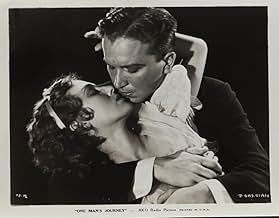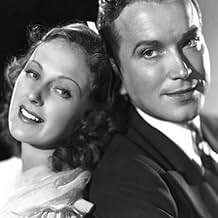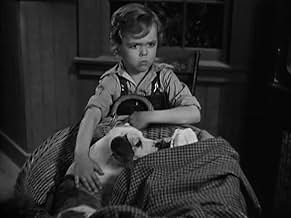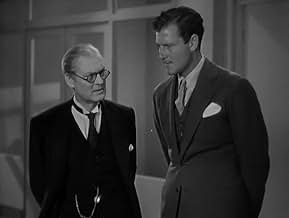Ajouter une intrigue dans votre langueWidower Dr. Watt moves to a small town, raising son Jimmy and abandoned Letty. Despite aspirations for research, epidemic, family needs hinder his goals. Years later, he realizes his life wa... Tout lireWidower Dr. Watt moves to a small town, raising son Jimmy and abandoned Letty. Despite aspirations for research, epidemic, family needs hinder his goals. Years later, he realizes his life wasn't a failure.Widower Dr. Watt moves to a small town, raising son Jimmy and abandoned Letty. Despite aspirations for research, epidemic, family needs hinder his goals. Years later, he realizes his life wasn't a failure.
- Réalisation
- Scénario
- Casting principal
- Récompenses
- 3 victoires au total
Samuel S. Hinds
- Dr. Babcock
- (as Sam Hinds)
Frank Ball
- Townsman
- (non crédité)
Dorothy Gray
- Letty's Daughter
- (non crédité)
John Ince
- Dr. James Carson
- (non crédité)
Lloyd Ingraham
- Townsman at Farewell Meeting
- (non crédité)
Dave O'Brien
- Dance Extra
- (non crédité)
Avis à la une
8tavm
Just discovered on Mark Evanier's blog that Turner Classic Movies-on their blog-are running a feature every month. One Man's Journey is for June. This just-rediscovered RKO release from 1933 stars Lionel Barrymore as Dr. Eli Watt, a widowed man with 6-year old son Jimmy (Buster Phelps) coming back to his old country roots. Since many of the townspeople are nearly poor, Dr. Watt accepts payment in potatoes or other foods. That's what the husband of his first patient offers to him. This husband-a McGinnis (David Landau)-gets some good news and bad news. Good: He has a healthy baby girl. Bad: The mother died giving birth. McGinnis wants no part of his girl's life and threatens to kill Eli. For four years, Eli helps raise the girl with Jimmy, a dog, and their housekeeper Sarah (May Robson). Then McGinnis, having rehabilitated himself, wants her back. We then flash-forward about 15 or so years with that daughter Letty (Dorothy Jordan) grown up and helping Dr. Watt care for several children with smallpox. Son Jimmy (now played by Joel McCrea) is becoming a doctor himself. I'll stop here and mention some other players: James Bush as Bill Radford-Letty's eventual husband, Frances Dee as Joan Stockton-Jimmy's fiancée (and later McCrea's real-life wife), Dorothy Gray as Letty's daughter who has a heart-tugging scene with Barrymore when he's carrying her, and Samuel S. Hinds (or Sam Hinds as he's credited here) as Dr. Roger Babcock who pays Eli a very high compliment at the end that makes a marked contrast to me when I remember their later roles on It's a Wonderful Life as-respectively-Peter Bailey and Henry F. Potter-fighting over foreclosures in front of Bailey's son George. All of them give wonderful performances with Mr. Lionel Barrymore at his most heartwarming throughout. There's also some stirring yet underplayed musical scoring by Max Steiner. In summation, One Man's Journey is one of those "they-don't-make-them-like-they-used-to" pictures that makes you wish they still did!
One Man's Journey is the sentimental filmed tale of the life of a country doctor as played by Lionel Barrymore. It's a nice, but very dated story, doctors like Barrymore are sadly a thing of the past.
Barrymore arrives back in his hometown, a widower with a small son who later grows up to be Joel McCrea and follows in his father's footsteps as a physician. In fact he starts off on the wrong foot by losing the mother during a difficult pregnancy. The daughter from that pregnancy grows up to be Dorothy Jordan and she's more Barrymore's child than she is of David Landau.
May Robson's in this film also as Barrymore's feisty housekeeper who brings an aged feminine touch to his household as well as a streak of practicality. She's probably the best one in the film.
One Man's Journey bears a lot of resemblance to Goodbye Mr. Chips. Like Chips the schoolmaster in Great Britain, Barrymore's Doctor Eli Watt affects literally hundreds of lives during the course of his time on earth. Like his son Joel McCrea said in a much later picture, Eli Watt enters his house justified.
It's a nice film, terribly dated though and that's not a good thing.
Barrymore arrives back in his hometown, a widower with a small son who later grows up to be Joel McCrea and follows in his father's footsteps as a physician. In fact he starts off on the wrong foot by losing the mother during a difficult pregnancy. The daughter from that pregnancy grows up to be Dorothy Jordan and she's more Barrymore's child than she is of David Landau.
May Robson's in this film also as Barrymore's feisty housekeeper who brings an aged feminine touch to his household as well as a streak of practicality. She's probably the best one in the film.
One Man's Journey bears a lot of resemblance to Goodbye Mr. Chips. Like Chips the schoolmaster in Great Britain, Barrymore's Doctor Eli Watt affects literally hundreds of lives during the course of his time on earth. Like his son Joel McCrea said in a much later picture, Eli Watt enters his house justified.
It's a nice film, terribly dated though and that's not a good thing.
Lovely movie from an earlier time. Incredibly well-acted by most concerned. Except for McCrea, who, it seems to me, is as stiff as a board. While I realize he was supposed to exude a sort of heartless diffidence, I don't think that's the problem; I just don't think he had really come into his own yet. Of course he was a tall, handsome guy with a good voice and, with time, he became a solid actor -- but it's interesting to see him upstaged by almost everyone in this early entry.
And while the film can feel "dated," what is one to expect from a bit of art that was made so long ago? Perhaps that sense of "datedness" comes from the fact that today we are just so "aware" and cynical. Personally, I like the tone of the film....
And while the film can feel "dated," what is one to expect from a bit of art that was made so long ago? Perhaps that sense of "datedness" comes from the fact that today we are just so "aware" and cynical. Personally, I like the tone of the film....
Lionel Barrymore gave a memorably restrained performance in this 1933 film. It stands as a precursor to films such as 1959's "The Last Angry Man" with Paul Muni.
The setting takes place in rural America circa 1910. Having lost his wife in childbirth, Barrymore returns to his roots only to lose his first patient there as well to child-birth. The embittered husband is ready to take the baby to the poor house but Barrymore takes the little baby girl in along with his young son. Just on the girl's 4th birthday, the father returns and seems much reformed. Barrymore gives the girl, Letty, back to him. Letty maintains a father-like relationship with Barrymore through the years.
As the years pass, Barrymore wins the hearts of the town with his dedication and free services for the impoverished.
He lets opportunities pass which could have gotten him out of the town. Some how we know this from the George Bailey effect of 1946's "It's A Wonderful Life." Like George Bailey, this doctor is going nowhere.
May Robson costars as a beloved housekeeper who enters the Barrymore home at precisely the right time.
This is a nicely done heartwarming story of rural America from 1910 through 1933.
The setting takes place in rural America circa 1910. Having lost his wife in childbirth, Barrymore returns to his roots only to lose his first patient there as well to child-birth. The embittered husband is ready to take the baby to the poor house but Barrymore takes the little baby girl in along with his young son. Just on the girl's 4th birthday, the father returns and seems much reformed. Barrymore gives the girl, Letty, back to him. Letty maintains a father-like relationship with Barrymore through the years.
As the years pass, Barrymore wins the hearts of the town with his dedication and free services for the impoverished.
He lets opportunities pass which could have gotten him out of the town. Some how we know this from the George Bailey effect of 1946's "It's A Wonderful Life." Like George Bailey, this doctor is going nowhere.
May Robson costars as a beloved housekeeper who enters the Barrymore home at precisely the right time.
This is a nicely done heartwarming story of rural America from 1910 through 1933.
Lionel Barrymore played a country Doctor who healed bodies as well as hearts. He helps Dorothy Jordan and James Bush and than later, Joe McCrea ( as his son) and Frances Dee. He played a character who was good hearted & hard working & was often only paid with potatoes as recompense. Sentimental, up-lifting, self-sacrifice & nobility all figure into the picture. It was remade in 1938 as A Man to Remember with Edward Ellis in the Barrymore role. The roles of Dee & Bush were dropped & in this case the son ( lee Bowman) falls in love with Anne Shirley--as the Jordan character. Acting was good all around. Jordan is pretty much forgotten today. She made several films in the early '30's and then married Merian C.Cooper. McCrea & Dee married shortly after making this picture. James Bush was in many films up to the early '50's, mostly in small, uncredited roles.
Le saviez-vous
- AnecdotesMerian C. Cooper had accused RKO of not paying him all the money contractually due for six RKO films he produced in the 1930s. In 1946, a settlement was reached, giving Cooper complete ownership of the RKO titles: Idylle sous les toits (1933) with Ginger Rogers, La femme aux gardénias (1933) with Ann Harding and William Powell, The Right to Romance (1933) with Ann Harding and Robert Young, One Man's Journey (1933) with Lionel Barrymore, Living on Love (1937) and A Man to Remember (1938).
In 2006, Turner Classic Movies, which had acquired the rights to the six films after extensive legal negotiations, broadcast them on TCM in April 2007, their first full public exhibition in over 70 years. TCM, in association with the Library of Congress and the Brigham Young University Motion Picture Archive, had searched many film archives throughout the world to find copies of the films in order to create new 35mm prints.
- GaffesAs Dr. Watt leaves the McGinnis house, the shadows of the trees fall clearly on the "sky" cyclorama.
- ConnexionsFeatured in TCM: Twenty Classic Moments (2014)
- Bandes originalesDown By the Old Mill Stream
(1910) (uncredited)
Written by Tell Taylor
In the score during the opening credits and at the end
Meilleurs choix
Connectez-vous pour évaluer et suivre la liste de favoris afin de recevoir des recommandations personnalisées
Détails
- Date de sortie
- Pays d’origine
- Langue
- Aussi connu sous le nom de
- El viajero solitario
- Lieux de tournage
- Société de production
- Voir plus de crédits d'entreprise sur IMDbPro
- Durée
- 1h 12min(72 min)
- Couleur
- Rapport de forme
- 1.37 : 1
Contribuer à cette page
Suggérer une modification ou ajouter du contenu manquant

























